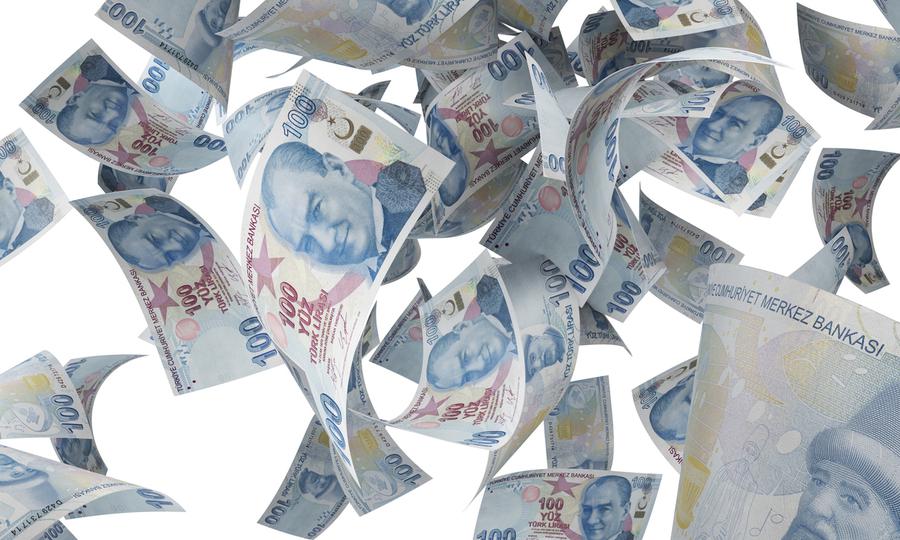President Recep Tayyip Erdogan sounds like a mafioso, and now he lends like one, too
Plunging bond yields occupied the main ring in Wednesday’s economic circus, but the Turkish sideshow was more exciting. The US yield curve continued to invert, showing that US investors are betting on a rate cut.
As I wrote yesterday, a slowing labor market has produced an air pocket in consumption, and US economic growth in 2019 is likely to be about half of last year’s 3%. US equity prices were flat to moderately lower.

Fearing a massive currency devaluation just before the March 31 municipal elections, Turkey’s government Wednesday forced overnight interest rates up to 1,300%. News reports claim that the Turkish government ordered banks not to lend a single lira to overseas borrowers, making it hard to hedge the beleaguered Turkish currency.
The lira held for the moment, but the cost of hedging against Turkish risk in credit and foreign exchange markets spiked and Turkish equities collapsed, with the US-traded Turkish ETF down around 8% on the day.

Nothing like this has ever happened. The Turkish central bank is like the condemned man who tries to beat the gas chamber by holding his breath. The absolute lack of liquidity will shut down the Turkish economy within weeks, and the lira will collapse anyway.
The Turkish lira collapsed during the summer of 2018, and the Turkish central bank drastically raised interest rates, forcing the economy into recession. But Turkey is far from the bottom, and a second round of rapid lira deprecation is beginning.
Although the central bank managed to keep the lira stable by effectively shutting down the banking system, every risk parameter has exploded. The cost of buying insurance against Turkish default on dollar sovereign debt jumped from about 300 basis points above the London 3-month interbank rate earlier this week to nearly 500 basis points, and the cost of hedging Turkish lira in the options market roughly doubled.

During the past two years, Turkish President Recep Tayyip Erdogan has dismissed or imprisoned 160,000 public officials, seized the assets of 1,000 companies worth up to $60 billion, closed down scores of media outlets and imprisoned 160 journalists. These data are from Wikipedia, which is blocked in Turkey. Turkey’s credit-fed economic bubble popped last year and the Turkish lira collapsed, throwing the country into deep recession.
Industrial production is down 10% year-on-year and unemployment has risen to 13.5 from 9.6% in April 2018. With $300 billion in hard-currency debt, Turkish companies can’t scrape up interest payments in devalued Turkish lira, and the economy faces a downward spiral.
The country desperately requires fresh capital, but prospective sources of new money are few given Erdogan’s penchant for turning erstwhile friends into enemies. Saudi Arabia objects to Erdogan’s patronage of the Muslim Brotherhood, which is trying to overthrow the Saudi monarchy (Erdogan tried to use the murder of Saudi spook Jamal Khashoggi to destabilize the Saudi regime).
China is furious at Erdogan for encouraging Uighur separatists in Xinjiang province, whom China considers dangerous subversives. The United States slapped sanctions on Turkey last year over the imprisonment of an American Protestant minister on risible charges of terrorism.
Turkey also has a chronic current account deficit, now equal to about 4% of GDP. The Erdogan credit bubble helped Turks to buy imported consumer goods on credit, but the country no longer can finance the deficit. Turkey’s GDP has already fallen by 3.5% over the past year and will fall by that much again. A wave of corporate and individual bankruptcies threatens to overwhelm its banking system.
Ultimately Turkey will have to go back to the International Monetary Fund and accept a de facto receivership of its crippled economy. A prolonged period of falling incomes and reduced consumption will be required to stabilize the current account and pay down foreign debt.
Erdogan has stayed in power since 2003 by delivering economic benefits to voters who didn’t necessarily support his neo-Ottoman imperial agenda, and he stands to lose those voters as the economy shrinks. Evidently, he decided to sacrifice the credibility of the country’s central bank in order to avoid humiliation in the March 31 local elections, trading a possible short-term advantage for long-term pain.
By DAVID P. GOLDMAN
Source: Asia Times



